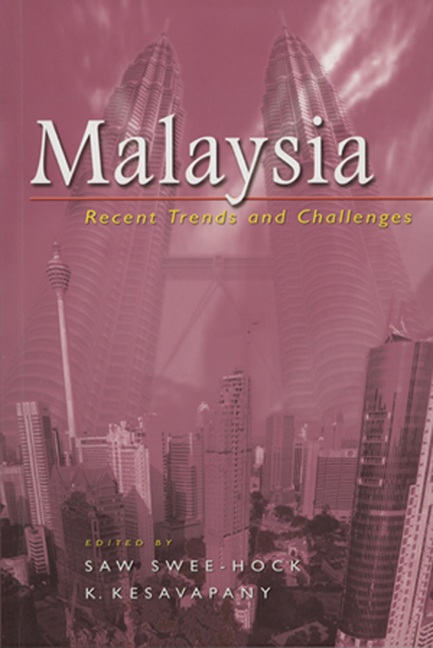Book contents
- Frontmatter
- Content
- Preface
- Foreword
- Contributors
- 1 Population Trends and Patterns in Multiracial Malaysia
- 2 The Emerging Politics of Islam Hadhari
- 3 Bangsa Malaysia: Vision or Spin?
- 4 The 2004 Malaysian General Elections: Economic Development, Electoral Trends, and the Decline of the Opposition
- 5 The UMNO-PAS Struggle: Analysis of PAS's Defeat in 2004
- 6 The Malay Electorate in 2004: Reversing the 1999 Result?
- 7 UMNO and BN in the 2004 Election: The Political Culture of Complex Identities
- 8 Malaysia's Civil Service Reform: Mahathir's Legacies and Abdullah's Challenges
- 9 Reinventing Governance in Corporate Malaysia: The Challenges Ahead
- 10 Globalisation and Ethnic Integration in Malaysian Education
- 11 Globalisation and the Challenges Facing Malaysia's Economy
- 12 Promising Start to Malaysia-Singapore Relations
- Bibliography
- Index
9 - Reinventing Governance in Corporate Malaysia: The Challenges Ahead
Published online by Cambridge University Press: 21 October 2015
- Frontmatter
- Content
- Preface
- Foreword
- Contributors
- 1 Population Trends and Patterns in Multiracial Malaysia
- 2 The Emerging Politics of Islam Hadhari
- 3 Bangsa Malaysia: Vision or Spin?
- 4 The 2004 Malaysian General Elections: Economic Development, Electoral Trends, and the Decline of the Opposition
- 5 The UMNO-PAS Struggle: Analysis of PAS's Defeat in 2004
- 6 The Malay Electorate in 2004: Reversing the 1999 Result?
- 7 UMNO and BN in the 2004 Election: The Political Culture of Complex Identities
- 8 Malaysia's Civil Service Reform: Mahathir's Legacies and Abdullah's Challenges
- 9 Reinventing Governance in Corporate Malaysia: The Challenges Ahead
- 10 Globalisation and Ethnic Integration in Malaysian Education
- 11 Globalisation and the Challenges Facing Malaysia's Economy
- 12 Promising Start to Malaysia-Singapore Relations
- Bibliography
- Index
Summary
Introduction
Finally, Malaysia has a new prime minister in 22 years. The smooth yet historic power transition from one of the longest-serving to one of the few pre-selected prime ministers in Asia draws everyone's attention to the unique democratic procedures in Malaysia. Without any unruliness taking place in the background of this momentous event, Malaysia once again proves to the rest of the world that the local political scenario takes on a somewhat sound and stable base.
With the new prime minister installed, it is traditional to expect to see some changes, if not at all, to the administration. The most popular question remains whether or not this new administration will result in new ways of doing things or at least improved methods in dealing with issues and problems. This question takes on more importance when framed within the context of the business or corporate environment.
This chapter is simply oriented toward this interesting question. It is tempting to explore the nexus between the new administration and the forthcoming challenges facing Corporate Malaysia. The authors argue that a solid policy response from the new administration is required to empower Corporate Malaysia to enter into the new liberalised market economy. And they, therefore, foresee that in doing so, there needs to be a clear definitive role between the state and the market. Without this, Corporate Malaysia risks loosing its advantages and thus possibly damaging Malaysia's competitiveness.
In keeping with this onus, this chapter is organised in the following manner. It first introduces and defines key terms used in the chapter. It then analyses the corporate governance landscape in Malaysia whereby this overview forwards two main discussions: (1) the history of corporate governance inherited by the new administration and (2) how problems or setbacks during this history were treated and their observable effects today.
- Type
- Chapter
- Information
- MalaysiaRecent Trends and Challenges, pp. 210 - 229Publisher: ISEAS–Yusof Ishak InstitutePrint publication year: 2005

